The Supreme Court has once again ruled that forced arbitration clauses in contracts are enforceable, and that they can be used to preempt class-action lawsuits, even in cases where class-action suits are the only economically feasible way for the plaintiff to make its case. [More]
mandatory binding arbitration

Supreme Court Deals Another Blow To Consumers, Lets Companies Use Forced Arbitration To Skirt The Law

Charles Schwab Drops Class-Action Ban Clause From Contracts
After AT&T somehow convinced the U.S. Supreme Court that a couple of sentences buried toward the end of a contract that maybe .05% of customers ever think about reading was all that was needed to preempt class-action lawsuits, many large companies have rushed to pack their user agreements and licenses with clauses that force customers into arbitration. But, stuck in a battle with an industry regulator, the folks at Charles Schwab have decided to go another way, announcing that they have gotten rid of the part of their arbitration clause that bans class-action suits… for now. [More]

Supreme Court To Decide Whether Companies Can Use Forced Arbitration To Skirt Federal Laws
It’s been nearly two years since the Supreme Court slapped U.S. consumers across the face, ruling in AT&T Mobility v. Concepcion that companies could take away customers’ rights to class-action lawsuits by including a tiny arbitration clause in user agreements. Today, SCOTUS hears another arbitration case that could shift the balance even further in favor of corporations. [More]
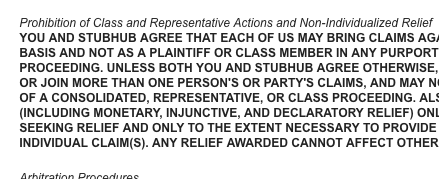
Now You Can No Longer File Class-Action Suits Against StubHub; Here’s How To Opt Out
Yet another company with the potential to tick off a lot of consumers has slipped a consumer-unfriendly mandatory binding arbitration clause into its user agreement. This time, it’s the ticket re-selling marketplace StubHub, but there is a way for users to opt out of this clause. [More]
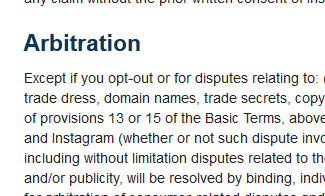
Here’s How To Opt Out Of Instagram’s New Arbitration Clause
Among the other controversial changes to Instagram’s Terms of Service is a spanking new forced-arbitration clause that, as things do, effectively takes away consumers’ rights to band together in a class-action against the company. Thankfully, you can opt out of the clause in writing before Feb. 15, 2013. [More]
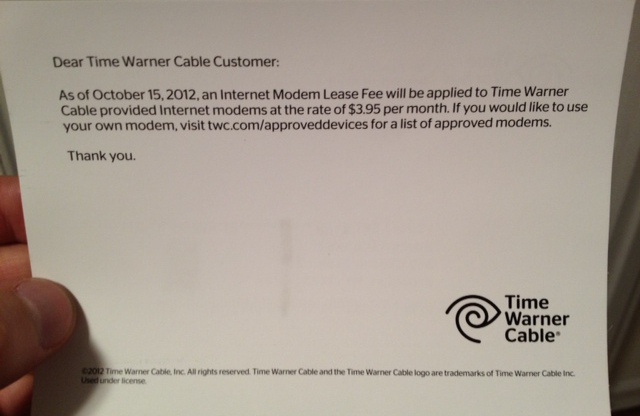
Two Class-Action Suits Filed Over Time Warner Cable’s Modem Rental Fee
We had a hunch this would happen when Time Warner Cable unceremoniously gave customers two-weeks notice that they would soon be paying a monthly modem rental fee for equipment that was already installed — the cable company is now a defendant in two identical lawsuits filed earlier today. [More]
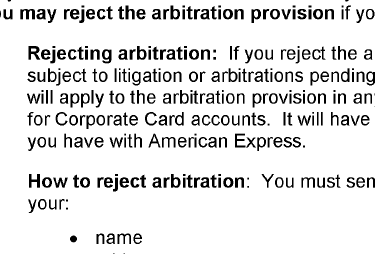
American Express Tries To Sneak Forced Arbitration Clause On Users, Gives Until Feb. 15 To Opt Out
It’s the hot new trend in business: Forcing customers into binding arbitration that take away their rights to sue as a group. The latest to latch onto this trend is American Express, which did its best to hide the clause on the final pages of their statements, but which is also giving them until Feb. 15, 2013 to opt out. [More]

Will Opting Out Of eBay Arbitration Clause Get My Account Deleted?
For weeks, we’ve been reminding eBay customers that they have until Nov. 9 to opt out of a new forced arbitration clause in the website’s user agreement that takes away consumers’ right to band together in a class-action suit. We’ve also been hearing concern from people that their accounts will be closed by eBay if they choose to opt out. [More]

Here Is A Downloadable Template For Opting Out Of PayPal Arbitration Clause
We already told you that perennial Worst Company In America heavyweight PayPal added a clause to its user agreement that forces customers with legal complaints into mandatory binding arbitration and takes away their right to band together in a class action. You can opt out of the clause by sending a very specifically formatted letter; luckily there’s now a template. [More]

PayPal Slips Forced Arbitration Clause Into User Agreement; Gives You Until Dec. 1 To Opt Out
As we’ve mentioned before, eBay recently changed its terms of service to include a mandatory binding arbitration clause that effectively takes away customers’ rights to pursue class-action lawsuits against the company. So it should come as no surprise that eBay subsidiary (and perennial Worst Company In America contender) PayPal has added a similar clause to its user agreement. But just like the eBay clause, users do have a short window to opt out. [More]

Reminder: Write eBay By Nov. 9 To Opt Out Of Restrictive, Anti-Consumer Clause
As we mentioned a few weeks back, the new user agreement for eBay includes one of those lovely little clauses that takes away customers’ right to a lawsuit against the company and locks them into mandatory binding arbitration. Fortunately, it also includes the ability to opt out of that clause, but you have to do it in the form of an actual letter, which has to be postmarked by Nov. 9. [More]
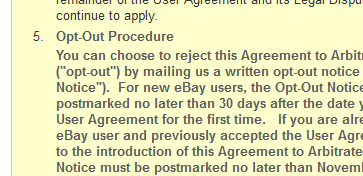
eBay Users Have Until Nov. 9 To Opt Out Of Mandatory Binding Arbitration
In 2011, when AT&T convinced the Supreme Court that the inclusion of a mandatory binding arbitration clause buried deep in a contract effectively precludes customers from filing a class, it was immediately obvious that more and more companies would begin including such clauses in their terms of service. The latest company is eBay, which has given users until Nov. 9 to opt out — in writing — of the clause. [More]

Microsoft Updates Service Agreement To Make It Easier To Read The New Mandatory Binding Arbitration Clause
While we appreciate that Microsoft has made its online services agreement much easier to read, the update comes with a questionable addition: a shiny new mandatory binding arbitration clause with class action waiver. The clause states that you agree to settle any legal disputes (except intellectual property rights disputes) in either the small claims court in your county of residence or Microsoft’s, or through the arbitration procedure outlined in the agreement. Microsoft announced that this change was coming awhile back, and has already added similar language to its XBOX Live service. [More]
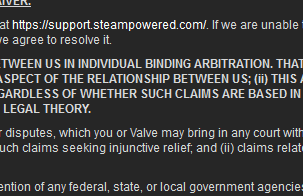
Video Game Publisher/Seller Valve Now Forcing Customers Into Mandatory Binding Arbitration
Valve, the makers of popular video game series like Portal, Left 4 Dead, Half-Life, and Team Fortress, as well as the operators of the Steam online marketplace for games, have surprised fans this week by changing the Steam terms of service to effectively pre-empt any class-action lawsuits by forcing customers into mandatory binding arbitration. [More]
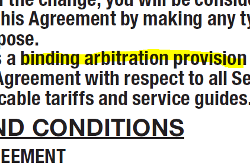
Turns Out That Forcing Customers Into Arbitration Is Not Good For Consumers
A year ago this week, the U.S. Supreme Court issued a landmark ruling in the AT&T Mobility v. Concepcion case. It decided that a company could force customers into arbitration — and effectively pre-empt any class-action lawsuits — by including a tiny clause in their contracts. At the time, AT&T had the gall to claim that this was all for the benefit of you, the consumer, but a new study proves what you probably already guessed: AT&T was full of it. [More]

Watch Now The Live Senate Hearing On Whether Forced Arbitration Is Fair
Here’s a live webcast of the judiciary committee’s hearing on mandatory binding arbitration going on right now. The title of the hearing is “Arbitration: Is it Fair When Forced?” Arbitration clauses appear in all sorts of consumer contracts and they mandate that in order to use the product or service, you have to agree to give up your right to sue if anything goes wrong. Originally designed for businesses to expedite disputes with other businesses, binding arbitration clauses are now also a popular way for companies to strip consumers of their basic legal rights. Since the hearing is chaired by Senator Al Franken, you know there’s bound to be some good zingers. Pop the popcorn and sit back! [More]

How To Say No To Arbitration With Your Cable Company
Here’s something neat. Comcast, Time Warner Cable, and Cablevision/Optimum actually let customers opt out of arbitration when they sign up. If you don’t want to give up your right to personally sue them in a court of law and be forced into a kangaroo court overseen by a judge whose fees are paid for by the company you’re suing, Cablevision will let you. The caveat is that you have to tell them within 30 days of signing your contract. Here’s the links and relevant contract language to opt-out: [More]

Senators Introduce Bill To Ban Mandatory Binding Arbitration Clauses In Cellphone Contracts
When you buy a new cellphone you have to sign a contract where you give up your right to sue. You agree to what’s called, “mandatory binding arbitration.” This is a bad thing to give to an industry that has high levels of complaints about hidden fees and abusive anti-consumer practices. Because if their crummy customer service fails to remedy an issue, your last resort option is to participate in a kangaroo court system that is paid for out of fees paid by the cellphone companies themselves. So Senators Richard Blumenthal (D-CT) and Al Franken (D-MN) have today introduced The Consumer Mobile Fairness Act that would ban mandatory arbitration clauses in cellphone contracts. [More]

